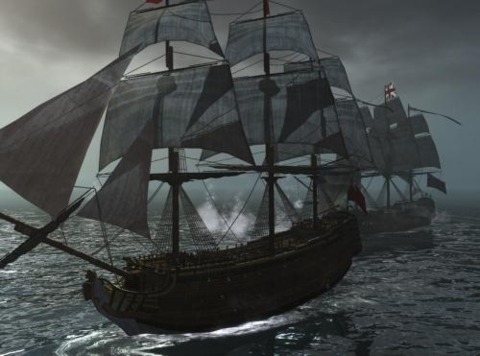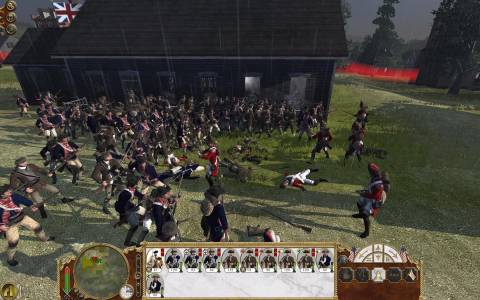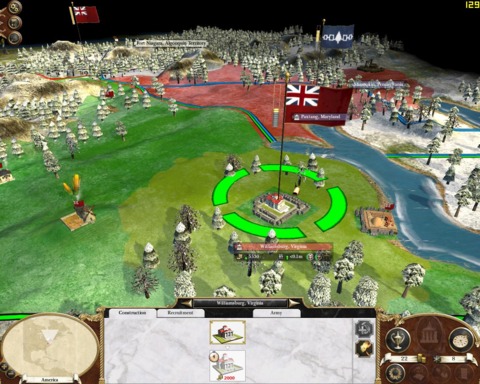
All this is heartbreaking because the rest of Empire: Total War is so amazing. It's quickly engrossing, and ensures that you'll get so far into its Civilization meets Cossacks meets Pirates gameplay that you'll lose sleep playing just one more turn in the game's historical Grand Campaign. As one part 4X turn-based strategy and one part real-time battle manager, Empire puts you in command one of ten nations as you fight, collude, and outbuild your enemies in hopes of constructing the world's largest empire. The game takes place during the 18th century, which turns out to be the perfect backdrop for the action, representing a time when the world began to fully realize the riches and rewards of global colonization. This is simply a huge game that has not only armies to manage but diplomacy, technology, taxes, religion, trade routes, and even individual scholars and agents that move along the game's well-built world map. Want to assassinate a known philosopher next turn? Go for it. The turn after that, you can ally with a small American-Indian nation and recruit their warriors into your own army.
The game's many layers would be daunting if it weren't for Empire's Road to Independence, which is an introductory campaign that slowly eases you into management of your empire as you play the soon-to-be United States over four structured episodes. The first, based on the founding of Jamestown by British colonials, will have you learning your way around a battlefield and your city management menus as you fight back the local indigenous residents of Virginia. In the second you'll be making alliances and fighting off the French on both land and sea in a larger setting during the French and Indian War. Episode III has you declaring independence, founding the United States, and fighting your way way from Boston as you reclaim the continent. The last episode is essentially just a version of the game's Grand Campaign mode where you assert the United States as a world power. Although most veteran Total War players might look past this stuff, it's extremely well done both as a light history lesson and as a tutorial. It's also the only way to actually open up the United States as a playable nation in the Grand Campaign.

The cloud-laden world map is a lively centerpiece that takes most of the tedium out of the Civilization-style blueprint and focuses instead on the movements and machinations of your scholars, troops, and warships. Setting up a trade route involves nothing more then making the right bribe to the right country. In turn, attacking an enemy's trade routes and ports rewards you with some much-needed currency to fund your campaign. If your trade route crosses the open sea, you'll not only have to worry about warring nations, but pirates who seem to plague certain high trafficked areas of the map like the Caribbean. The UI keeps things simple and once you've decided upon a course of action you'll very rarely have to revisit it. The only negative against the world map is that like similar games in the genre, you'll be spending a lot of time waiting between turns as your enemy moves across the map. While you can turn off viewing the enemy movements, you're still looking at a few minutes of downtime.
Battles take place whenever you move your army or navy against an opposing force or city. Unless you've sent agents in ahead of time, you might not know what you're up against, so it's best to build up before you head in. Once you're engaged, the game changes to a real-time battlefield where you command your troops over rolling hills, farms, and even famous period-specific forts. The inclusion of muskets and gunpowder to the series makes the actual fighting even more strategic than its predecessors. Gone are the days when you could easily turn the tide with a single squad of cavalry. Charging against a well-entrenched line of militia will make you quickly revise the strategies you used in Medieval or Rome. You can also quarter your troops in buildings and farmhouses around a city for extra cover. Doing so seems to be the favorite early battle strategy of the enemy AI, who will sit inside a building even though your cannons, placed a hundred yards away, will rain shot with relative ease until the building is destroyed with a satisfying explosion.
Though they look amazing, the battlefields are where Empire seems a tad rushed. A large portion of both the multiplayer and single-player components of Empire involve you either attacking or defending forts. Unfortunately, the line of sight and pathfinding algorithms in and around forts seems completely busted at the moment. Units placed near mounted canons will not man them, units on top of fort walls will often not fire at units below, and moving a squad of riflemen from one side of a fort to the other is an exercise in futility. Outside of forts, you'll run into fence lines that sometimes cause problems for your cavalry, and phantom hills that will cause your rushing army to run in place.
Your cannon placement is also limited by the AI's inability to judge when it should stop firing. On one fort defense battle I had cannons placed in front of my fort's walls in hopes they could rain down on my approaching enemy before they got to the gates. While I was fighting on my flank, I noticed my cannons, which I had left in free-fire mode, had decided to continue firing at the enemy through my own walls, making a giant point of entry and leaving me laughing at the screen. Musketmen have similar problems deciding when to stop shooting, even if your own units cross in front of them. While the friendly fire casualties are a welcome dose of realism (though not new to this series), the previous Total War games had less chance of it since most of your projectiles--mostly arrows--had a deeper arc. This wouldn't be as serious an issue if your units' movements were a little more dependable.

Empire's multiplayer is currently limited to single-battle skirmishes through the game's internal matchmaker. The only problem I really had with multiplayer centers around the host in a quick match having the option to determine your starting position. You'll notice a lot of unscrupulous players will task you with defending a fort, and since neither player usually wants anything to do with fighting around a fort, this can often leave you at a disadvantage against a larger attacking force outside your walls. Otherwise, multiplayer is a blast, mostly because you're forced to implement all your strategies in real time. (The camapign allows you to pause combat to issue orders.) I should note that Creative Assembly recently announced a version of the campaign mode will be available in multiplayer soon through a patch. How much fun it will be waiting for your enemy to make his turn is unknown, though my guess is they'll allow you to play in this mode over the course of several days.
In the end, Empire's only blemish is its unresponsive units and pathing. For a game whose greatest thrills result from the specific gambles you make with your troop movements, it's a shame you're sometimes punished when that movement seems out of your control. Even with its flaws, though, the newest Total War is so breathtaking and immersive that it's hard not to recommend to avid strategy fans. Games this deep seem to be a dying breed, and though it's not something I'd feel comfortable recommending to more casual players, patient fans of the genre should know the sheer scope and complexity of the game currently has no equal and is worth weathering the hiccups. Cautious buyers, however, might want to wait a few weeks and see if these issues are resolved in a patch, something that, as of this writing, the team at Creative Assembly seems eager to provide.